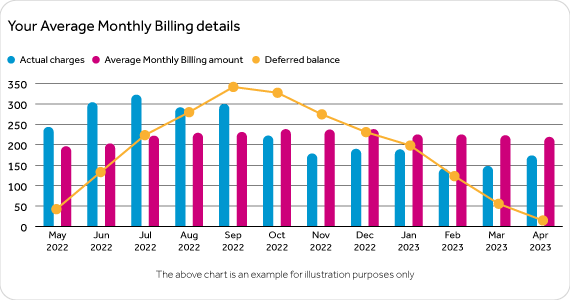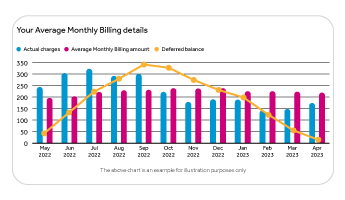-
Average Monthly Billing is a free budgeting tool that can help smooth out bill amounts over the year’s seasons by averaging current usage charges with previous usage charges instead of paying the highs and lows of seasonal bills.
At Reliant, we're committed to helping you simplify your electricity bill. Let Average Monthly Billing help you manage your monthly electricity bill amounts by smoothing out seasonal electricity usage charges. By spreading higher-usage months’ costs over a year, you can better manage and budget for your electricity costs.



Average Monthly Billing works by calculating a current average monthly bill amount based on your last 12 months of usage charges.¹ Your Average Monthly Billing amount is recalculated each month and can fluctuate as your electricity usage changes.
During the months when you use more electricity, like in the summer or winter, a portion of your higher bill is added to your deferred balance.² This allows you to pay a little less during high-usage months while the deferred balance is averaged into future Average Monthly Billing amounts in smaller installments.
While Average Monthly Billing doesn’t lower your overall annual usage charges, it allows your bill amounts to be a little more predictable so you can budget effectively.
Fluctuations in your Average Monthly Billing amounts are normal and are based on your electricity usage
The Average Monthly Billing amount is recalculated on each bill with your most recent usage history
Increasing your electricity usage will increase your Average Monthly Billing amount
Lowering electricity usage can help reduce your Average Monthly Billing amount
Reliant plan name |
|
Energy charge 1,864 kWh @ $0.144972/kWh |
$270.23 |
CenterPoint Energy delivery charges |
$113.46 |
Current charges |
$383.24 |
Current Average Monthly Billing amount |
$289.00 |
The actual current usage charges are $383.24, and the Average Monthly Billing amount was $289.00.
$94.24 is the difference between actual current usage charges and the Average Monthly Billing amount. It will be added to the deferred balance and calculated into the Average Monthly Billing amount, resulting in a higher average on the next bill.
Reliant plan name |
|
Energy charge 1,189 kWh @ $0.144972/kWh |
$172.37 |
CenterPoint Energy delivery charges |
$74.18 |
Current charges |
$246.55 |
Current Average Monthly Billing amount |
$287.00 |
The actual current usage charges are $246.55, and the Average Monthly Billing amount was $287.00.
-$40.45 is the difference between the actual current usage charges and the Average Monthly Billing. It will be subtracted from the deferred balance and calculated into the Average Monthly Billing amount, resulting in a lower average on the next bill.
Average Monthly Billing is a free budgeting tool that can help smooth out bill amounts over the year’s seasons by averaging current usage charges with previous usage charges instead of paying the highs and lows of seasonal bills.
First, we add your current usage charges to your last 12 months of usage charges (or the number of months available, if fewer than 12) for your service address. Then, we take that total and divide it by 12 months (or the total months available for your service address, if fewer than 12). Finally, we add 1/12 of your deferred balance credit or debit, which is the difference between your Average Monthly Billing amounts and your current actual usage charges. This calculation is redone every month, so your Average Monthly Billing amount on each bill will fluctuate slightly depending on your usage.
Each bill will show your Average Monthly Billing amount due that month, as well as your actual usage charges and deferred balance. The deferred balance may be a credit or a debit.
You can use the same payment options for your electricity bill payment as you would with regular billing. You can sign up for AutoPay to have the amount automatically paid each month, or you can pay by phone, by mail, through your online account or at a walk-up payment location near you. We accept credit/debit cards and checks.
Please call us at 1-866-222-7100 to cancel average billing. You cannot stop Average Monthly Billing online.
Any credit or debit deferred balance will be applied to your next bill.
We will calculate your Average Monthly Billing amount using the available historical usage of your service address and your current price.
Any credit or debit deferred balance will be applied to your final bill.
The deferred balance amount is the cumulative difference between your Average Monthly Billing amounts and your actual usage charges. The deferred balance amount can be found on your monthly bill. If the deferred balance amount is a credit, 1/12 will be subtracted from your Average Monthly Billing amount. If the deferred balance amount is a debit, 1/12 will be added to your Average Monthly Billing amount. If you’re a new Average Monthly Billing customer, the deferred balance will begin in the second month. Any owed deferred balance must be paid in full if you cancel Average Monthly Billing or terminate your account with us.
You may be eligible to have your deferred balance carried over to your new address. If you are eligible at the time you request a transfer of service, we will let you know.
1 If there is no previous billing in your name at the service address with Reliant, or you do not have 12 months of usage at the service address, we will take the historical usage at that service address and apply your current price to calculate your Average Monthly Billing amount.
2 The deferred balance amount is the cumulative difference between your Average Monthly Billing amounts and your actual usage charges. The deferred balance amount can be found on your monthly bill. If the deferred balance amount is a credit, 1/12 of it will be subtracted from your Average Monthly Billing amount. If the deferred balance amount is a debit, 1/12 will be added to your Average Monthly Billing amount. If you’re a new Average Monthly Billing customer, the deferred balance will begin in the second month. Any owed deferred balance must be paid in full if you cancel Average Monthly Billing or terminate your account with us.